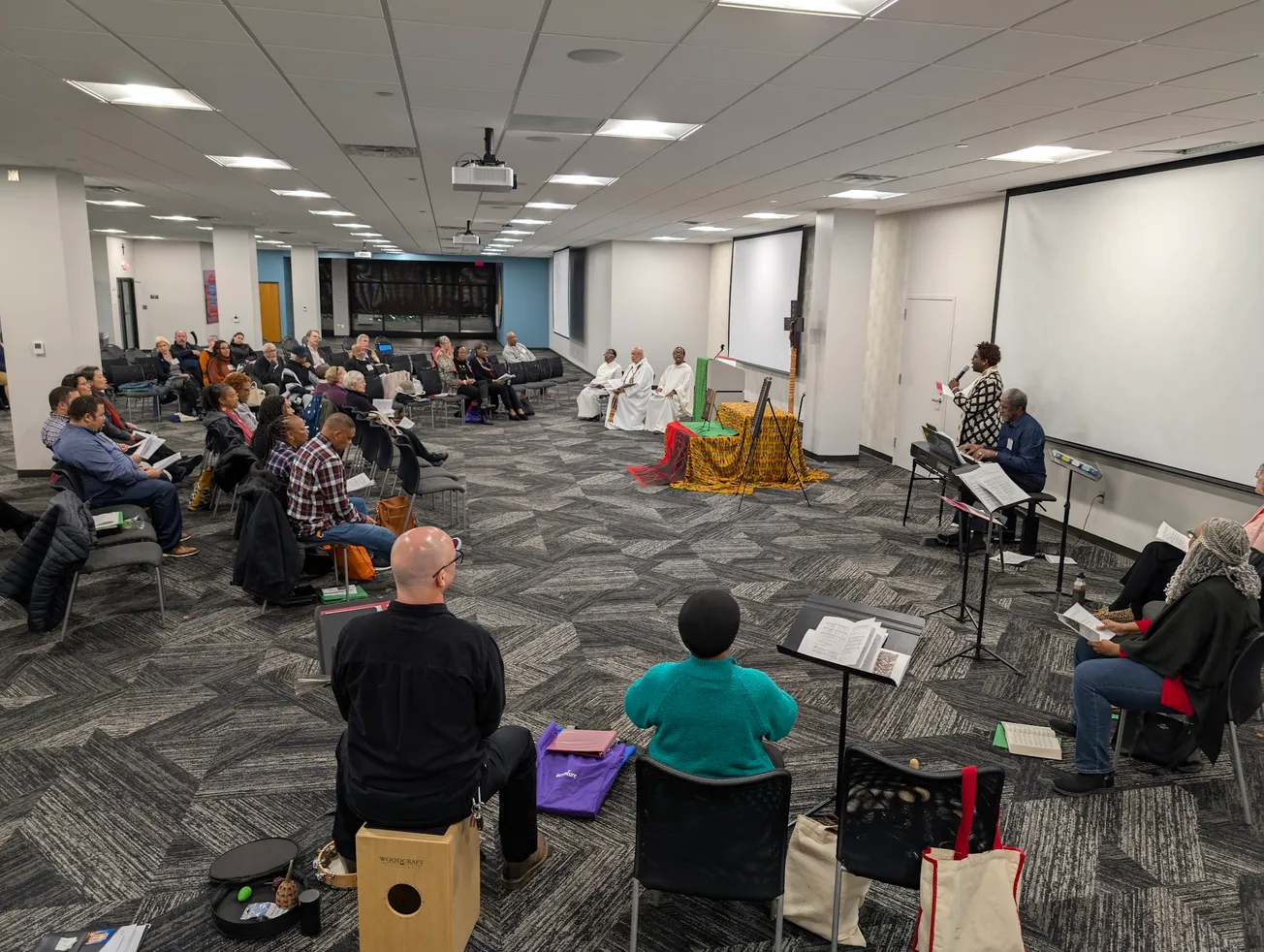Black Catholics and allies from around the country gathered over the weekend in Southwest Ohio this weekend, where the “Seeking for a City” academic symposium brought together scholars, musicians, theologians, and students to celebrate the legacies of pioneering liturgist Fr Clarence Rivers and the Black Catholic bishops’ 1984 pastoral letter “What We Have Seen and Heard.”
Rivers died 20 years ago this month after a career of incubating and pushing forward the work of Black Catholic liturgy, having been the first Black man ordained for the Archdiocese of Cincinnati. The bishops' letter, released near the peak of the Black Catholic Movement, came 40 years ago this September, on the feast of St. Peter Claver.
The symposium, which began Friday afternoon at the University of Dayton, featured keynote presentations from a trio of Black Catholic scholars, kicking off with Dr. Kim Harris’ presentation of her 2021 article on the intersection of two consequential Black Catholic liturgies: Rivers’ groundbreaking “An American Mass Program” in 1964 and the likewise seminal “Missa Luba,” which originated in the Belgian Congo in the 1950s.
Saturday brought a keynote from Bishop Emeritus Edward Braxton of Belleville, who worked from his 2021 text “The Church and the Racial Divide,” to explain the complications of race and marginalization in the nation and in the Church. A third keynote, from the Jesuit priest Joseph A. Brown, linked the bishops' “What We Have Seen and Heard” letter to the restorative mode of Black spirituality—especially music—and the related exigencies of continued White domination in U.S. Catholicism.
“Those bishops came from a list that the National Black Catholic Clergy Caucus, the National Black Sisters’ Conference, and lay leaders submitted. They were nominated by the people,” he said, speaking of the successful 20th-century protests that led to Popes Paul VI and John Paul II appointing the first African-American Catholic bishops.
“We’ve had bishops since then where the people said, ‘Who are they? Who is he? I've never heard of him.’ Of course you have never heard of him. The bishops picked him because you had never heard of him. Because that's not the point anymore.”
The talks were punctuated by African-American renderings of the Liturgy of the Hours, as well as breakout sessions led by a diverse group of presenters, including White and Black Catholics of various generations as well as a number of Catholic converts.
On this feast of St. Cecilia, African-American vespers here at the University of Dayton for the Symposium on Black Catholic Liturgy and Culture.
— Nate Tinner-Williams (@natemup) November 23, 2024
The conference marks the 40th anniversary of the Black bishops' letter "What We Have Seen and Heard" and 20 years since the death of… pic.twitter.com/rSLq33a1Q7
From Dr. Kevin P. Johnson’s biographically infused take on the evolution of Black Catholic liturgy (including his upcoming hip-hop Mass) to Dr. Deanna Witkowski’s exploration of Catholic jazz liturgy in the careers of Mary Lou Williams and Eddie Bonnemère, the conference offered a wide variety of topics related to the twin anniversaries being celebrated.
Another breakout came from Daryl Grigsby, an author and activist from California, and Dr. Cynthia Bailey Manns, one of two African-American delegates to the Synod on Synodality, which concluded its proceedings in Rome last month. Their breakout covered the possibility of women in the permanent diaconate, which was a focus of much discourse during the synod and is as yet unresolved.
“The lessons from the Black bishops and Fr Rivers, one, is about women as leaders, but [also] their experience in social inequalities, because that suffering, I think, gives him a unique perspective relative to service. And as we know, the word ‘deacon’ is not just about preaching but it's also about service,” said Grigsby.
“The ministry of the diaconate is broken,” added Manns. “They seem to be mini-priests; they are [supposed to be] a ministry of service to those on the margins… So our request was that if we're thinking about dropping women into this ministry, fix it.”
The synod’s other African-American delegate, Cardinal Wilton Gregory of Washington, was present on Sunday in Cincinnati to greet symposium participants during a pastoral visit to St. Joseph Catholic Church, where Fr Rivers served in the 1950s and 60s.
Thereafter, he celebrated the 11am Mass at the Cathedral Basilica of St. Peter in Chains for the feast of Christ the King—the solemnity on which Rivers died in 2004. The Mass, concelebrated with Archbishop Dennis Schnurr of Cincinnati, was one of few in recent years to feature the music and Mass settings of Rivers, who is considered the father of Black Catholic liturgy.
“I am deeply privileged for the invitation to share in this Eucharist that acknowledges and gives thanks for the multi-talented gifts of one of your most beloved priests,” Gregory told the Cincinnati faithful during his homily.
“For those of you who knew him personally, perhaps especially members of his own beloved family, you know that Clarence would have considered the solemn feast of Christ the Universal King, perchance, the only true appropriate liturgical occasion on which to pay him tribute."
Nate Tinner-Williams is co-founder and editor of Black Catholic Messenger.
Want to donate to BCM? You have options.
a.) Support our #iGiveCatholic campaign.










